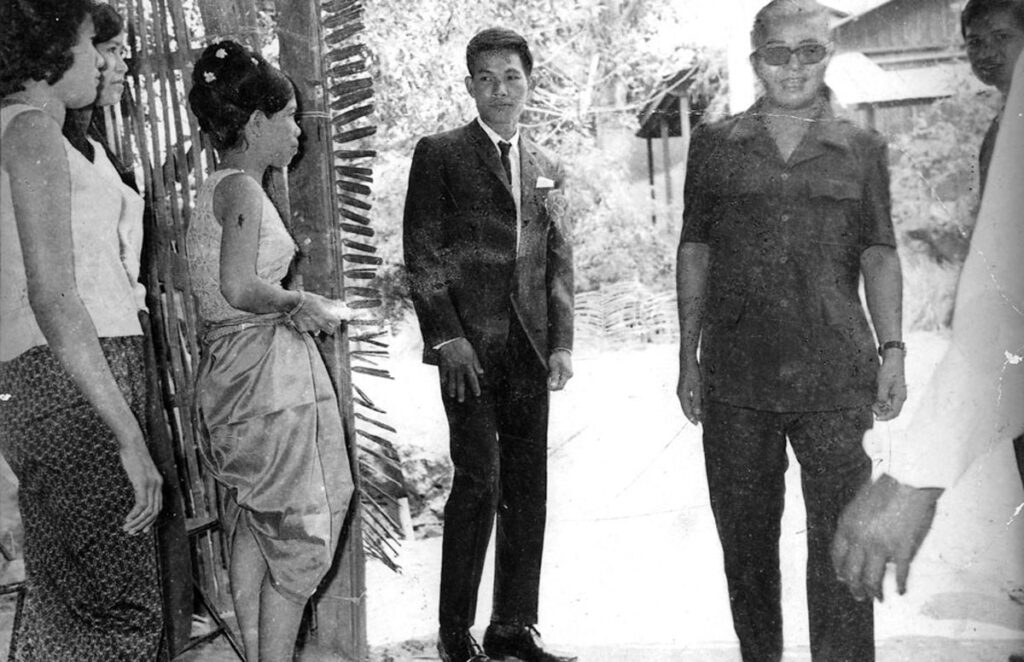When he was 18 years old, my husband was ordained a monk. He passed his baccalaureate examination in the Pali language. Chuon Nat, the head of his monastery, ordered him to teach other monks. But Sopheak was facing financial problems, so he quit and took the entrance exam to work as a trial court clerk. He got the third-highest score and a posting in Phnom Penh.
We always struggled together in our marriage. At first, we had only one bicycle and lived in a rented house, but later we owned a house in Phnom Penh and bought a car.
My husband liked to do good deeds. Whenever I went to the market, he told me not to buy or cook any creatures that were alive. He did bad deeds only twice. The first time was when my family did not have enough food and he decided to go fishing. He caught a fish and didn’t want to kill it, but he had to so we could eat. The second time, he went to the rest room and accidentally stepped on a baby chick. Sopheak never drank alcohol. One night, he was at a party and his friends forced him to drink. When he came home he said, “I violated my own moral conduct.”
My husband never used harsh words with me and was kind to everyone. When he was working as a clerk in Takhmau, he never asked any money from the poor people. If they were willing to pay him or give him food instead of money, then he accepted.
His boss Huot Mann was very honest. He wanted my husband to be responsible for finding evidence in cases that would be brought before the court. But my husband refused; he thought he wasn’t cut out for that sort of work. So, he registered newborn children instead.
My family was not evacuated until April 19, 1975 because our house was located on the outskirts of Phnom Penh. We wanted to go to our house in Takhmau, but were instead forced toward Takeo Province. I had some relatives there.
When the Khmer Rouge asked us about our biographies, Sopheak told us not to lie because people in the village knew our family. So when they ordered my husband and two elderly people to chop down trees in the jungle for a week, I dared not hope he would return. But seven days later, he came home.
Sopheak also came back safely a second time. He had the idea that he should run away to Vietnam. When the Angkar ordered him to chop down bamboo, he told me that if he didn’t return for a long time, it probably meant that he had left for Vietnam. But after three days, he came back, saying that the situation was very tense and he had not been able to flee.
At the end of 1975, the Angkar ordered us to Battambang Province. My husband was delighted because it was close to the Cambodia-Thai border. We were sent to a village with wonderful supple green rice fields. There, my husband met his friend Lieng, a former tax inspector. Lieng tried to convince him to run away, but it was almost time for me to give birth, so he said he would re-consider after I had delivered the baby. Those ran away never returned home.
My daughter Rakha, who had been building dams, came to visit n 1976. I tried to convince her not to return to her unit, but Rakha was afraid that her unit chief would punish her if she stayed. So she went back, but I never saw her again. After the regime fell, I heard that she had died of starvation.
In 1977, a distant relative of my husband’s called Chuop tried to persuade him to run away. Chuop had been a soldier and showed Sopheak a rifle he had kept for a long time. My husband said no; he was afraid that if he ran away, my children and I might be killed by the Angkar. Chuop fled with three other villagers; no one has seen them since.
One night, my husband had a strange dream that he was making a speech at a meeting when people suddenly ran in and tied his hands behind his back. At that moment, there was a burst of applause and the country was then at peace. When he woke up, he gathered the title to the house, his car keys and driver’s license, and burnt them all.
Three days later, the cooperative chief called Sopheak to a meeting. I handed him a krama [a traditional checkered scarf], but he told me to keep it. He said, “Do not try to find me. It is the end of my life now. Please take good care of all the children.” He walked a few steps out of the house, and then turned back to hand me a cigarette lighter, saying he no longer needed it. Later I heard that my husband was put in Preh Net Preh Pagoda. I think my cousin Sreng reported him, but he was taken away next.

